|
THE TRAMP AND THE RAILROAD
By Josiah Flynt
Author of "The Tramp at Home," "The City Tramp,"
etc.
with pictures by Jay Hambridge
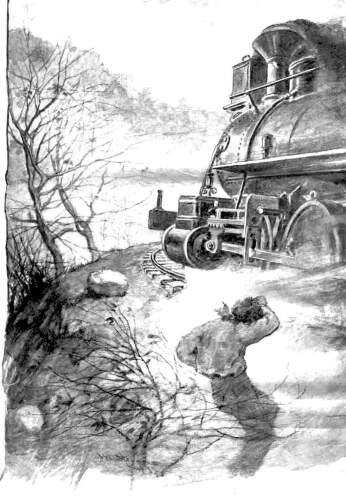 Five
years had elapsed since my last journey with the "hoboes"—indeed,
since I had so much as seen them. Study and recreation took me
to Europe in the autumn of 1893, and I did not return to this
country till the spring of 1898. Newspaper clippings containing
the accounts of the movements of the hoboes, and stories about
their life, occasionally reached me, and once there came an invitation
to be present at an Anti-Tramp Congress, but beyond this I heard
very little about my old companions of "the road." I
always thought of them, however, when I saw the European vagabond
trudging along on the public turnpikes, and wondered whether they
were still permitted to travel on the railroads in their "side-door
Pullmans" (box-cars) as they had done, and as they taught
me to do when I was among them. In eastern Prussia I once stopped
to talk with a foot-sore old wanderer on the chaussée,
and told him of the way the American tramp travels. "Ach,
how beautiful that must be!" he exclaimed. "And to think
that they would probably hang us poor fellows in the Fatherland
if we should try to ride in that fashion! In truth, son, a republic
is the only place for the poor and outcast." Five
years had elapsed since my last journey with the "hoboes"—indeed,
since I had so much as seen them. Study and recreation took me
to Europe in the autumn of 1893, and I did not return to this
country till the spring of 1898. Newspaper clippings containing
the accounts of the movements of the hoboes, and stories about
their life, occasionally reached me, and once there came an invitation
to be present at an Anti-Tramp Congress, but beyond this I heard
very little about my old companions of "the road." I
always thought of them, however, when I saw the European vagabond
trudging along on the public turnpikes, and wondered whether they
were still permitted to travel on the railroads in their "side-door
Pullmans" (box-cars) as they had done, and as they taught
me to do when I was among them. In eastern Prussia I once stopped
to talk with a foot-sore old wanderer on the chaussée,
and told him of the way the American tramp travels. "Ach,
how beautiful that must be!" he exclaimed. "And to think
that they would probably hang us poor fellows in the Fatherland
if we should try to ride in that fashion! In truth, son, a republic
is the only place for the poor and outcast."
There had been rumors, while I was still on the road, that
a day of reckoning was coming between the railroad companies and
the tramps, and that when it arrived the hobo, like the Chausséegrabentapezirer,
would take to the turnpikes. Life in Hoboland is so precarious
that it comes natural to the inhabitants to be on the watch for
impending catastrophes, and I remember that I also believed that
the railroad companies would eventually stop free riding as the
tramp practised it. It did not seem natural that a class of people
with so little influence as the tramps should be allowed to enjoy
such a privilege long; and although I learned to ride in freight-cars
with as much peace of mind and often more comfort than in the
passenger-coaches, there was always something strange to me in
the fact that I never bought a ticket. During my first trip in
Hoboland, which lasted eight continuous months, I must easily
have traveled over twenty thousand miles, and there were not more
than ten occasions during the entire experience when any payment
was demanded of me, and on those occasions the "medium of
exchange" consisted of such things as pipes, neckties, tobacco,
and knives. Once I had to trade shoes with a brakeman merely to
get across the Missouri River, a trip which ordinarily would have
cost me but ten cents; but as that was the very sum of which I
was short, and the brakeman wanted my shoes, the only thing to
do was to trade.
Had anyone told me, as I was leaving Europe, that a week after
my arrival in this country I should be "hitting the road"
again, I should not have believed him. Civilization had become
very dear to me in the interval that had elapsed since my last
tramp trip, and it seemed to me that my vagabond days were over.
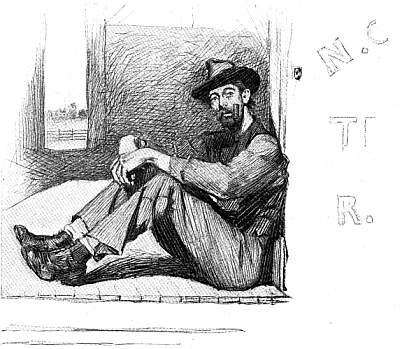 Once a
vagabond, however, like the reserve Prussian soldier, a man can
always be called on for duty, and it was my fate, a few days after
setting foot in my native land again, to be asked by the general
manager of one of our railroads to make a report to him on the
tramp situation on the lines under his control. For three years
he had been hard at work organizing a railroad police force which
was to rid the lines under his control of the tramp nuisance,
and he believed he was gradually succeeding in his task; but he
wanted me to go over his property and give an independent opinion
of what had been done. He had read some of my papers in THE CENTURY on tramp life,
and while reading them it occurred to him that I might be able
to gather information for him which he could turn to good account,
and he sent for me. Once a
vagabond, however, like the reserve Prussian soldier, a man can
always be called on for duty, and it was my fate, a few days after
setting foot in my native land again, to be asked by the general
manager of one of our railroads to make a report to him on the
tramp situation on the lines under his control. For three years
he had been hard at work organizing a railroad police force which
was to rid the lines under his control of the tramp nuisance,
and he believed he was gradually succeeding in his task; but he
wanted me to go over his property and give an independent opinion
of what had been done. He had read some of my papers in THE CENTURY on tramp life,
and while reading them it occurred to him that I might be able
to gather information for him which he could turn to good account,
and he sent for me.
"On assuming management of these lines," he said
to me in the conversation we had in his office, "I found
that our trains were carrying thousands of trespassers, and that
our freight-cars were frequently being robbed. I considered it
a part of my business as a general manager to do my utmost to
relieve the company of this expense, and I felt that the company
owed it to the public to refuse to harbor this criminal class
of people. In a way a railroad may be called the chief citizen
of a State, and in this tramp matter it seemed to me that it had
a duty as a citizen to discharge to the State.
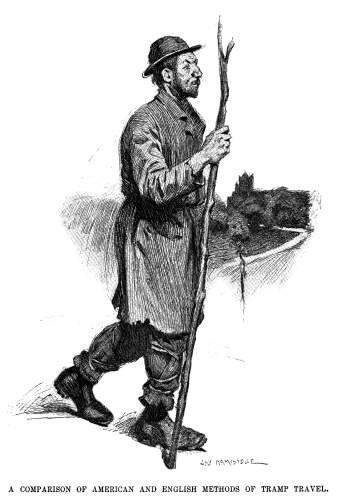 "There
are three conspicuous reasons that have deterred railroad people
from attacking the tramp problem. First, it has been thought that
it would entail a very great expense. Our experience on these
lines has shown that this fear was not warranted. Second, it has
been thought that no support would be given to the movement by
the local magistrates and police authorities. Our experience shows
that in a great majority of cases we have the active support of
the local police authorities and that the magistrates have done
their full duty. Third, it was feared that there might be some
retaliation by the tramps. Up to date we have but very little
to complain of on that score. From the reports that I get from
my men, I am led to believe that we are gradually ridding not
only the railroad property, but much of the territory in which
it is situated, of the tramp nuisance; but I should like a statement
from you in regard to the situation, and I want to know whether
you are willing to make a tramp trip and find out for us all that
you can." "There
are three conspicuous reasons that have deterred railroad people
from attacking the tramp problem. First, it has been thought that
it would entail a very great expense. Our experience on these
lines has shown that this fear was not warranted. Second, it has
been thought that no support would be given to the movement by
the local magistrates and police authorities. Our experience shows
that in a great majority of cases we have the active support of
the local police authorities and that the magistrates have done
their full duty. Third, it was feared that there might be some
retaliation by the tramps. Up to date we have but very little
to complain of on that score. From the reports that I get from
my men, I am led to believe that we are gradually ridding not
only the railroad property, but much of the territory in which
it is situated, of the tramp nuisance; but I should like a statement
from you in regard to the situation, and I want to know whether
you are willing to make a tramp trip and find out for us all that
you can."
It was a cold, bleak day in March when we had this conversation,
and there as every inducement to postpone a journey such as the
general manager suggested; but I was so impressed with his seriousness
in the matter, and so thoroughly interested in what he had done,
that I agreed to begin the investigation at once. It seemed to
me that a man who had written so much a bout the tramp problem
ought to be willing to do what he could to help the community
solve it, especially when he was to be reimbursed for his work
as liberally as I was to be; and although I suffered more on this
particular journey that on any other that I have made, I shall
never regret having undertaken it.
Before starting out on my travels a contract was drawn up between
the general manager and myself. It secured to me a most satisfactory
daily wage, and to the general manager weekly reports as long
as I was "out on the road," with a final statement when
the investigation should be finished.
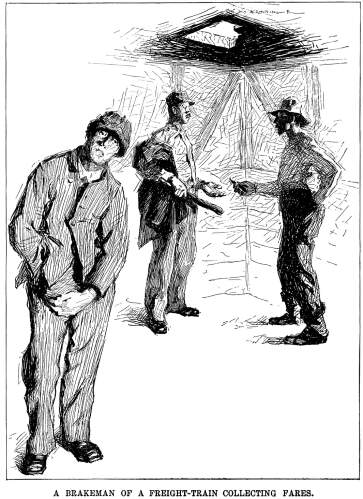 On
no previous journey in Hoboland have I been such an object of
curiosity to the tramps as on this one when writing my weekly
reports. I was dressed so badly that I could write them only in
lodging-houses where vagabonds sojourn, and it usually took me
a full half-hour to finish one. IT availed nothing to pick out
a quiet corner, for the men gathered about me the minute they
thought I had written enough, and they thought this before I was
half through. If they had been able to decipher my handwriting
I doubt whether I should be writing this article now, but as they
were not, they amused themselves with funny remarks. "Give
’er my love," they said. "Writin’ yer will,
are ye, Cigarette?" "Break the news gently." And
they made other similar remarks which, if I had not been forced
to write, would have smothered any literary aspirations that a
lodging-house is capable of arousing. As it was, I managed to
send in my reports more or less regularly, and faulty though they
must have been, they served their purpose. On
no previous journey in Hoboland have I been such an object of
curiosity to the tramps as on this one when writing my weekly
reports. I was dressed so badly that I could write them only in
lodging-houses where vagabonds sojourn, and it usually took me
a full half-hour to finish one. IT availed nothing to pick out
a quiet corner, for the men gathered about me the minute they
thought I had written enough, and they thought this before I was
half through. If they had been able to decipher my handwriting
I doubt whether I should be writing this article now, but as they
were not, they amused themselves with funny remarks. "Give
’er my love," they said. "Writin’ yer will,
are ye, Cigarette?" "Break the news gently." And
they made other similar remarks which, if I had not been forced
to write, would have smothered any literary aspirations that a
lodging-house is capable of arousing. As it was, I managed to
send in my reports more or less regularly, and faulty though they
must have been, they served their purpose.
They told the story of the tramp situation on about two thousand
miles of railroad property, situated in five different States.
The reports of the first month of the investigation pertained
to tramps on lines in the neighborhood of the property I was investigating.
I had not been an hour on my travels when it was made very plain
to me that my employer’s police force was so vigilant that
it behooved me not to be caught riding trains unauthorized on
his lines. Every tramp I met warned me against this particular
road, and although a clause in my contract secured me the payment
by the company of all fines that might be imposed upon me as a
trespasser, as well as my salary during imprisonment, in case
I should find it useful for my purposes to go to jail, I found
it more convenient for the first month to wander about on railroads
which I knew tramps could get over. I reasoned that the experience
was going to be hard enough anyhow, without having to dodge railroad
police every time I boarded a train, and I knew that the trespassers
on neighboring lines would be able to tell me what was the general
opinion in regard to my employer’s road as a tramp thoroughfare.
All whom I interviewed spoke of it as the hardest railroad in
the United States for a tramp to beat, and I could not have learned
more of the tramps’ opinion of it had I remained exclusively
on the property. The roads that I went over crossed and recrossed
my employer’s road at a number of places, and I was frequently
able to see for myself that it is a closed line for trespassers.
It may interest the reader to know how I lived during the time
I traveled as a tramp. Except on one occasion, when my funds gave
out, I paid my way regularly so far as food was concerned. A friend
sent me a postal order for a few dollars nearly every week, and
I managed to live rather comfortably at lodging-house restaurants.
Occasionally I would meet a "pal" of former years, and
if he had money, or found out that I had, nothing would do but
we should celebrate meeting each other again, and at such times
my friend in the East got word that my remittance must be hurried
up somewhat; but, as a general thing, I dined fairly well on two
dollars a week. For sleeping-quarters I had bunks in lodging-houses,
benches in police stations, and "newspaper beds" in
railroad "sandhouses." I chose one of these places as
circumstances suggested. If there was nothing to be gained in
the way of information by going to a sandhouse or police station,
I took in a lodging-house, if one was handy. Once I slept in the
tramp ward of a poorhouse, and never had I spent a more disagreeable
night. A crowd of tramps to which I had attached myself had used
up their welcome in a town where there were three police stations,
and it had been arranged that on the night in question we should
all meet at the tramp ward of the poorhouse. A negro was the first
one to get there, and a more frightened human being than he was
when the rest of us put in an appearance, it would be hard to
imagine. We found him in a cold cellar, absolutely without light
and furnished with nothing but an immense bench, about four feet
wide, four feet high, and ten feet long. In Siberia itself I have
never seen a gloomier hole for men to pass a night in.
"I turned up here ’bout five o’clock, the negro
said, "n’ they sent me to the smokin’ room, where
them luny blokes was smokin’ their pipes. I never knew before
that they sent luny people to poorhouses, ’n’ I couldn’t
understand it. I told one of ’em what I was there for, ’n’
he told me that this cellar down here has ghosts in it. Well,
o’ course, I ain’t ’feared o’ ghosts in most
places, but, by jiminy, when the keeper came ’n’ put
me down here ’n’ left me in the cold ’n’ dark,
somehow or other I got to thinkin’ o’ that luny bloke’s
stories, ’n’ I jus’ had to holler. W’y, I
never felt so queer before in my life. Suppose I’d gone crazy;
why, I could ’a’ sued the county for damages couldn’t
I? Don’t you ever soogest any more poorhouses to me; I don’t
wonder people goes crazy in ’em." When the crowd first
saw the negro he was shouting at the top of his voice: "Spirits!
spirits! There’s spooks down here!"
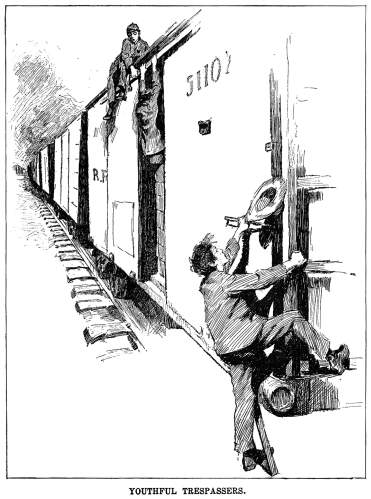 We all
spent a most miserable night in the cellar, and I doubt whether
any one of us would willingly seek shelter there again. We all
spent a most miserable night in the cellar, and I doubt whether
any one of us would willingly seek shelter there again.
Indeed, when the first month of my investigation was over,
and war had been declared with Spain, it seemed to me that I had
gone through so much and was so hardened that I could go to Cuba
and worry through all kinds of trouble. I have since regretted
that I did not go, but, at the time, I had become so interested
in the work that, hen I returned to my employer for further orders,
and he said to me, "Well, now that you have satisfied me
in regard to the attitude of the tramp toward the company’s
property, suppose you satisfy yourself concerning the attitude
of the company toward the tramp," I readily fell in with
the suggestion. To make my final report complete it was obvious
that I ought to get insight into the workings of my employer’s
police force, and for the second month he gave me permission to
travel on freight-trains, engines, and passenger-trains, and a
letter introducing me to the different employees of the company
with whom I was likely to come in contact. With these credentials
I was able to circulate freely over the property, to inquire minutely
into the work of the police department, to meet the local magistrates,
and particularly with the jail and work-house keepers. It was
also possible for me to make an actual count of the trespassers
who were daring enough to attempt to travel on this closed road.
This work was not so tedious and dangerous as that of the first
month, and there were more comforts to be enjoyed; but I had to
be up at all hours of the night, and the bulk of my time was spent
in train-riding. After thirty days of almost constant travel I
was convinced first that the tramps had told the truth about the
road, and that it is exceedingly difficult to trespass on it with
impunity; second, that although the police force is not perfect
(none is), it was doing exceptionally good work in freeing the
community of tramps and beggars. It differs from ordinary railroad
police forces in that it is systematically organized and governed.
In dealing with tramps and trespassers the plan is to keep continuous
surveillance of them, and they are taken off trains one by one,
day after day, rather than in squads of fifty and sixty, with
no more effort in this direction for weeks and sometimes months,
as is the prevailing custom on most railroads. There is consequently
very little crowding of magistrates’ courts and jails, and
the taxpayers are not forced to board and large a great collection
of vagabonds. I was also impressed with the fact that the force
is on friendly relations with municipal and village police organizations
along the road, and has the respect of communities formerly at
the mercy of a constantly increasing army of hoboes.
So much for my personal experience and finding in this latest
investigation in "trampology"; it was as interesting
a tramp trip as I have ever made, and I learned more about the
best methods to employ in attacking the tramp problem in this
country than on any previous journey. It is now my firm belief
that, if the tramps can be kept off the railroads, their organization
will become so unattractive that it will never again appeal to
men as it has done in the past; and the purpose of this paper
is to make plain the necessity of keeping them off the railroads,
and to show what results from their present unique position in
railroad life. No other country in the world transports its beggars
from place to place free of charge, and there is no reason why
this country should do so.
The custom has grown up in the United States in the last thirty
years. Before the Civil War there were comparatively few tramps
in America, and practically no railroad tramps. After the war
there suddenly appeared on the scene a large class of men who
had become so enamoured of camp life that they found it impossible
to return to quiet living, and they took to wandering about the
country. Occasionally they worked a little to keep themselves
in "pin-money," but by the 1870’s hundreds of them
had given up all intention of working, and had founded the organization
known to-day as the "Hobo-Push." By that year, also,
they had discovered that our turnpikes, particularly in the West,
were very poor roads to travel on, and they began to walk on the
railroad-track.
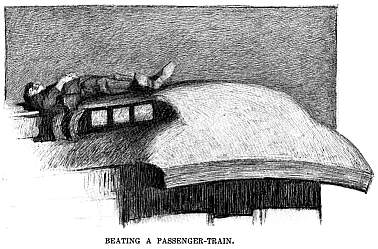 If, at
this time, the railroad companies had laws passed, such as are
in force to-day in Great Britain and on the Continent, forbidding
everybody but an employee to walk on railroad property, except
at public crossings, we should have learned, ere this, to obey
them, and the railroad tramp would not have been developed. These
laws not being enacted, however, it was not long before it became
very clear to the tramp that it would be much more comfortable
to sit in a box-car and ride, than to "drill" (walk)
over the ties. An appreciation of this character is acted upon
very soon in Hoboland, and by 1875 the majority of the professional
vagrants were taking lessons in jumping on and off moving freight
trains. The trainmen, partly because they thought many of these
trespassers were deserving but penniless out-of-works, and partly
on account of the inborn willingness of every American to help
a man in unfortunate circumstances, made practically no serious
effort to keep the tramp off their trains, and by 1880 the latter
was accepted by railroad companies as an unavoidable nuisance
on railroad property. If, at
this time, the railroad companies had laws passed, such as are
in force to-day in Great Britain and on the Continent, forbidding
everybody but an employee to walk on railroad property, except
at public crossings, we should have learned, ere this, to obey
them, and the railroad tramp would not have been developed. These
laws not being enacted, however, it was not long before it became
very clear to the tramp that it would be much more comfortable
to sit in a box-car and ride, than to "drill" (walk)
over the ties. An appreciation of this character is acted upon
very soon in Hoboland, and by 1875 the majority of the professional
vagrants were taking lessons in jumping on and off moving freight
trains. The trainmen, partly because they thought many of these
trespassers were deserving but penniless out-of-works, and partly
on account of the inborn willingness of every American to help
a man in unfortunate circumstances, made practically no serious
effort to keep the tramp off their trains, and by 1880 the latter
was accepted by railroad companies as an unavoidable nuisance
on railroad property.
To-day it is the boast of the hoboes that they can travel in
every State of the Union for a mill per mile, while in a number
of States pay nothing at all. On lines where brakemen demand money
of them, ten cents is usually sufficient to settle for a journey
of a hundred miles, and twenty cents often secures a night’s
ride. They have different methods of riding, among which the favorite
is to steal into an empty box-car on a freight-train. At night
this is comparatively easy to do; on many roads it is possible
to travel this way, undisturbed, till morning. If the train has
no "empties," they must ride on the top of the car,
between the "bumpers," on one of the car ladders, or
on the rods. On passenger-trains they ride on top, on the "blind
baggage," and on the trucks.
Taking this country by and large, it is no exaggeration to
say that every night in the year ten thousand free passengers
of the tramp genus travel on different railroads in the ways mentioned,
and that ten thousand more are waiting at watering-tanks and in
railroad yards for opportunities to get on the trains. I estimate
the professional tramp population at about sixty thousand, a third
of whom are generally on the move.
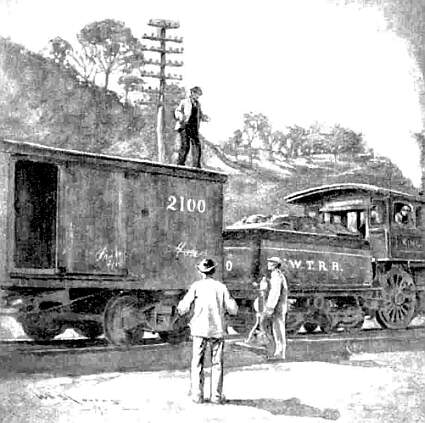 In the
summer the entire tramp fraternity may be said to be "in
transit." The average number of miles traveled daily by each
man at this season of the year is about fifty, which, if paid
for at regular rates, would cost, say, a dollar. Of course one
should not ordinarily pay so much to ride in a box-car as in a
passenger-coach, but the ordinary tramp is about as comfortable
in one as in the other, and, on the dollar-a-trip basis, he and
his 59,999 companions succeed in getting out of the railroad companies
sixty thousand dollars’ worth of free transportation every
day that they all travel. Multiply this figure by a hundred, which
is about the number of days in a year when all trampdom "flits,"
and you have an approximate idea of how much they gain. In the
summer the entire tramp fraternity may be said to be "in
transit." The average number of miles traveled daily by each
man at this season of the year is about fifty, which, if paid
for at regular rates, would cost, say, a dollar. Of course one
should not ordinarily pay so much to ride in a box-car as in a
passenger-coach, but the ordinary tramp is about as comfortable
in one as in the other, and, on the dollar-a-trip basis, he and
his 59,999 companions succeed in getting out of the railroad companies
sixty thousand dollars’ worth of free transportation every
day that they all travel. Multiply this figure by a hundred, which
is about the number of days in a year when all trampdom "flits,"
and you have an approximate idea of how much they gain.
Another serious loss to the railroads is that involved in the
disappearance of goods under-going transportation, and in claims
for personal injuries. Some tramps steal, and some do not, but
every year considerable thefts are made from freight-cars, and
tramps, or men posing as such, are generally the guilty parties.
Professional thieves frequently become tramps for a time, both
to minimize their guilt and to elude capture, and the probability
is that the majority of the greater thefts are committed by them.
Tramps proper are discouraged thieves, and I have seldom known
them to steal anything more valuable than fruit from freight-cars
and metal from idle engines. In a year’s time, however, including
all the thefts committed by both tramps and professional thieves,
a very appreciable loss results to the railroads, and I can recall,
out of my observation, robberies which have amounted to several
thousand dollars.
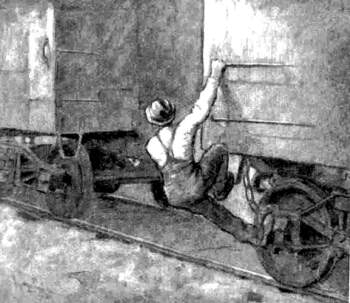 That railroad
companies should have to reimburse trespassers for the loss of
a hand or foot while riding unauthorized on trains will strike
every one as a very unjust tax on their resources, but such claims
are constantly made. Let us say, for example, that a young boy
who has been stealing his way on a freight-train loses a leg.
There is a type of lawyer who at once takes up a case of this
sort, going to the boy’s parents or relatives and suggesting
to them the advisability of claiming damages, asserting his readiness
to serve them in the matter. "All right" says the father;
"get what you can." In court the lawyer draws a horrible
picture of these engines of death, the railroads, showing how
they are constantly killing people. If the boy’s father is
poor, this fact is also brought graphically to the attention of
the jury, and the wealth of the corporation is described as something
enormous. If the lawyer manages his case cleverly, making out
that the boy was enticed on to the freight-train by the trainmen,
or that he fell under the wheels through their carelessness, there
are but few juries that will refuse to give the father at least
enough damages to pay the lawyer’s fee and the doctor’s
bill, and then there is a celebration over having "squeezed"
another railroad company. For a private person to be compelled
by a court to pay damages to the father of a boy who fell from
an apple-tree in the private person’s orchard, where the
lad was an obvious trespasser and thief, would be considered an
outrage. That railroad
companies should have to reimburse trespassers for the loss of
a hand or foot while riding unauthorized on trains will strike
every one as a very unjust tax on their resources, but such claims
are constantly made. Let us say, for example, that a young boy
who has been stealing his way on a freight-train loses a leg.
There is a type of lawyer who at once takes up a case of this
sort, going to the boy’s parents or relatives and suggesting
to them the advisability of claiming damages, asserting his readiness
to serve them in the matter. "All right" says the father;
"get what you can." In court the lawyer draws a horrible
picture of these engines of death, the railroads, showing how
they are constantly killing people. If the boy’s father is
poor, this fact is also brought graphically to the attention of
the jury, and the wealth of the corporation is described as something
enormous. If the lawyer manages his case cleverly, making out
that the boy was enticed on to the freight-train by the trainmen,
or that he fell under the wheels through their carelessness, there
are but few juries that will refuse to give the father at least
enough damages to pay the lawyer’s fee and the doctor’s
bill, and then there is a celebration over having "squeezed"
another railroad company. For a private person to be compelled
by a court to pay damages to the father of a boy who fell from
an apple-tree in the private person’s orchard, where the
lad was an obvious trespasser and thief, would be considered an
outrage.
I bring out these facts about the losses to the railroad in
some detail because the public is really the railroad company,
and consequently the sufferer.
To tell all that the country at large suffers from the free
railroad transportation of tramps would take me beyond the limits
of a paper of this character, but there are a few points which
must be noted. In the first place, the railroads spread the tramp
nuisance over a much greater stretch of territory than would be
the case if the tramps were limited to the turnpikes. There are
districts in the United States which are so difficult to reach
by the highroad, on account of unprofitable intermediate territory,
that the hobo would never attempt to go near them if it were not
easy for him to get over the disagreeable parts of the journey
in a box-car. Take the trip from Denver to San Francisco, for
instance. There is not a vagabond in the country who would undertake
to walk across the American Desert merely to reach "’Frisco,"
and if walking were the only way to get to that city it would
be left largely to "coast beggars." As maters now stand,
however, you may see a beggar one day in Fifth Avenue in New York
city, and a fortnight later he will accost you in Market street
in San Francisco. Many tramps can travel as rapidly as the man
who pays his way, and I have known those who could even "hold
down" the Chicago Limited from Jersey City to Chicago without
a break.
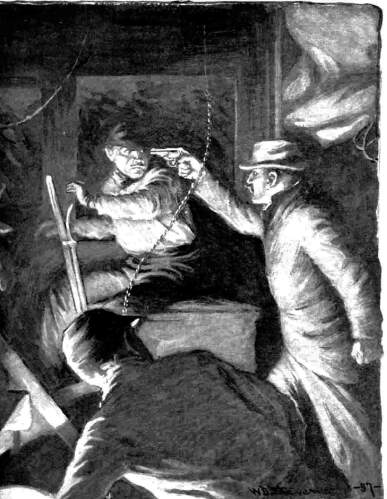 All
this contributes to the difficulty of locating and capturing the
dangerous characters of tramp life; and, as I have said, many
professional criminals, who have nothing to do with beggars in
other quarters, mix with them in freight-cars. All
this contributes to the difficulty of locating and capturing the
dangerous characters of tramp life; and, as I have said, many
professional criminals, who have nothing to do with beggars in
other quarters, mix with them in freight-cars.
A remark, in this connection, of Mr. Allen Pinkerton is popular
in Hoboland. He is reported by them to have once said, in a conversation
about the capture of criminals, that he thought he could catch,
in time, almost any kind of criminal except the tramp, and him
he could not catch because it was so difficult to locate him.
"One day he is in a barn, the next in a haystack, and the
next Heaven only knows where he is, for he has probably got on
to the railroad, and there you might as well look for a lost pin.
The railroads also help to keep the tramp element in our large
cities. It very seldom settles in the country, and not for any
length of time in provincial towns. New York, Chicago, Philadelphia,
Boston, San Francisco, Buffalo, Baltimore, New Orleans, and other
like places are its main strongholds. The more the criminal element
of a country fastens itself upon its cities, the harder it is
to break up, and in the United States this is what is taking place.
Chicago, for instance, is as much a center in the criminal as
in the business world, and almost every freight-train entering
it brings a contribution to its criminal population. Even without
railroads the tendency of crime to predominate in towns would
exist; evil-doers feel more at home in city streets and haunts
than in the country; but their present strength in our cities
is largely due to the free transportation they get from the railroads.
Another striking fact is that the out-of-works who "beat
their way" on freight-trains very easily degenerate into
professional vagabonds. I have traveled with men who, in six months’
time, had become voluntary vagrants merely because their first
stolen rides, while in search of work, had demonstrated to them
how easy it is to manage without working and paying their way.
The average unemployed man in the United States goes from one
large city to another, rather than, as is the custom in Europe,
taking in the intermediate towns and villages, where there is
no so likelihood of the labor market becoming congested. In a
few weeks, unless the man is of very strong character, he learns
to travel merely for travel’s sake, and develops onto a "stake-man,"
who only works long enough to get a "stake" and then
go off on a trip again. Among the so-called unemployed in this
country there are thousands of this type, and they are the result
of this love of side-door Pullman excursions.
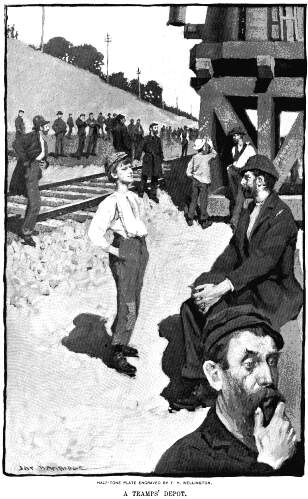 There is one more
fact which cannot be overlooked—the temptation which the
railroads have for a romantic and adventuresome boy. A child possessed
of Wanderlust generally wanders for a while, anyhow, but
the chance he now has to jump on a freight-train and "get
into the world quick," as I have heard lad of this temperament
remark, has a great deal to do in tempting him to run away from
home. Hoboland is overrun with youngsters who have got there on
the railroads, and very few of them ever wander back to their
parents. Once started "railroading," they go on and
on, and its attractions seem to increase as the years go by. Walking
has no such charms for them, and if it were their only method
of seeing the world, the majority of those who now keep on seeing
it, until death ends their roaming, would grow tired. The railroad,
however, makes it possible for them to keep shifting the scenes
they enjoy, and, in time, change and variety becomes so essential
that they are unable to settle down anywhere. They are victims
of what tramps call the "railroad fever," a malady for
which a remedy has yet to be prescribed. There is one more
fact which cannot be overlooked—the temptation which the
railroads have for a romantic and adventuresome boy. A child possessed
of Wanderlust generally wanders for a while, anyhow, but
the chance he now has to jump on a freight-train and "get
into the world quick," as I have heard lad of this temperament
remark, has a great deal to do in tempting him to run away from
home. Hoboland is overrun with youngsters who have got there on
the railroads, and very few of them ever wander back to their
parents. Once started "railroading," they go on and
on, and its attractions seem to increase as the years go by. Walking
has no such charms for them, and if it were their only method
of seeing the world, the majority of those who now keep on seeing
it, until death ends their roaming, would grow tired. The railroad,
however, makes it possible for them to keep shifting the scenes
they enjoy, and, in time, change and variety becomes so essential
that they are unable to settle down anywhere. They are victims
of what tramps call the "railroad fever," a malady for
which a remedy has yet to be prescribed.
CAN the tramps be driven off the railroads?
It was to satisfy my own curiosity in regard to this question,
and to find out how successful my employer, the general manager,
had been in his attempt to answer it in the affirmative, that
I undertook the investigation which I have prescribed. Previous
to his efforts to keep tramps off the railroads, it had been thought,
as he has stated, that it was cheaper to put up with them, nuisance
though they were, than to pay the bills which a crusade against
them would occasion. It has at last been demonstrated, however,
that tramps can be refused transportation by one of our greatest
railroads, with a saving of expense to the company and with great
benefit to the community, and the time has come when the public
is justified in demanding that all railroads take a similar stand
in regard to this evil.
If all the railroad companies would agree upon concerted action
against tramps, in a few years the following very satisfactory
results would be achieved: first, very few tramps, if any, would
try to beat their way on trains; second, an appreciable number
of them would give up tramping entirely, because their present
railroad privileges are to many the main attractions of the life;
third, a few would try to become professional criminals again,
partly because tramping on the turnpikes would be to disagreeable;
and, fourth, a large number would take to the highways, where
some might be made to do farm-work, and where all would, at least,
be in touch with farm life. The reader may take exception to the
third possibility, and think that great harm would come of an
increase in the professional criminal class; but, as I have said,
tramps are really discouraged criminals, and a return to the old
life, of which they made a failure, would only land them in the
penitentiary.
It is probably impossible ever entirely to eliminate the vagrant
element in a nation’s life, and no such help is held out
in connection with the reform advocated in this article: had all
the railroads been as closed to tramps, during my first excursions
in Hoboland, as one of them has recently become, one man, at least,
would not have attempted any free riding, and would not have found
so many tramps to study.
Stories Page | Contents Page
|







